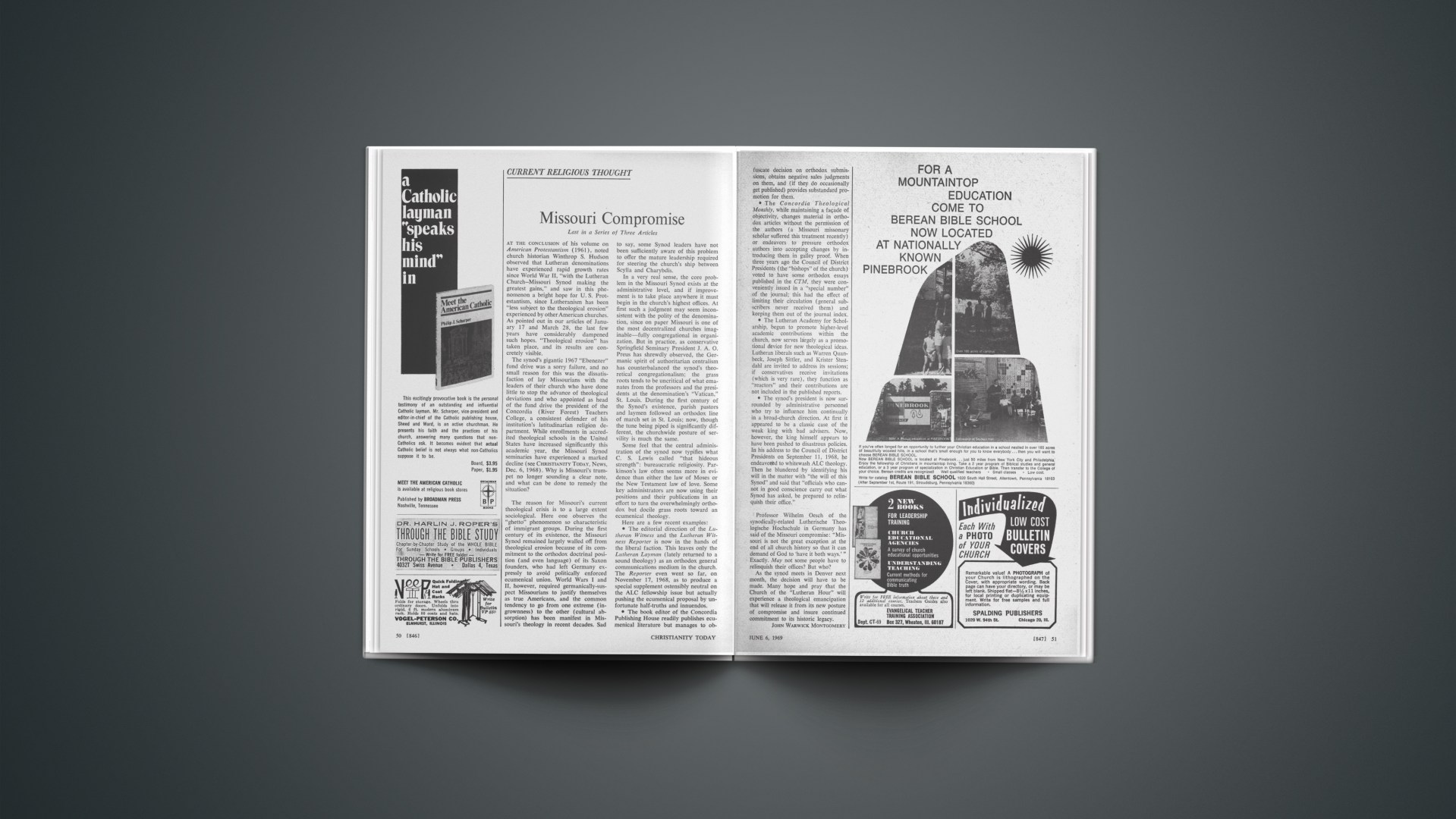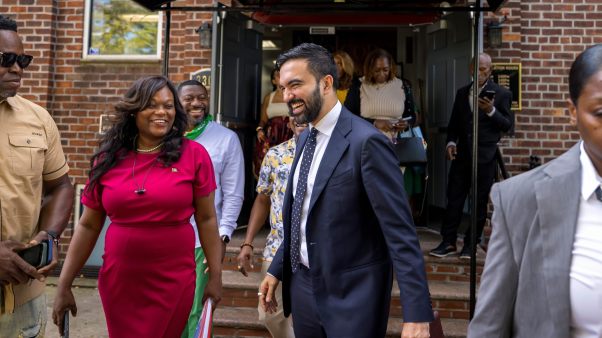Last in a Series of Three Articles
At the conclusion of his volume on American Protestantism (1961), noted church historian Winthrop S. Hudson observed that Lutheran denominations have experienced rapid growth rates since World War II, “with the Lutheran Church-Missouri Synod making the greatest gains,” and saw in this phenomenon a bright hope for U. S. Protestantism, since Lutheranism has been “less subject to the theological erosion” experienced by other American churches. As pointed out in our articles of January 17 and March 28, the last few years have considerably dampened such hopes. “Theological erosion” has taken place, and its results are concretely visible.
The synod’s gigantic 1967 “Ebenezer” fund drive was a sorry failure, and no small reason for this was the dissatisfaction of lay Missourians with the leaders of their church who have done little to stop the advance of theological deviations and who appointed as head of the fund drive the president of the Concordia (River Forest) Teachers College, a consistent defender of his institution’s latitudinarian religion department. While enrollments in accredited theological schools in the United States have increased significantly this academic year, the Missouri Synod seminaries have experienced a marked decline (see CHRISTIANITY TODAY, News, Dec. 6, 1968). Why is Missouri’s trumpet no longer sounding a clear note, and what can be done to remedy the situation?
The reason for Missouri’s current theological crisis is to a large extent sociological. Here one observes the “ghetto” phenomenon so characteristic of immigrant groups. During the first century of its existence, the Missouri Synod remained largely walled off from theological erosion because of its commitment to the orthodox doctrinal position (and even language) of its Saxon founders, who had left Germany expressly to avoid politically enforced ecumenical union. World Wars I and II, however, required germanically-suspect Missourians to justify themselves as true Americans, and the common tendency to go from one extreme (ingrownness) to the other (cultural absorption) has been manifest in Missouri’s theology in recent decades. Sad to say, some Synod leaders have not been sufficiently aware of this problem to offer the mature leadership required for steering the church’s ship between Scylla and Charybdis.
In a very real sense, the core problem in the Missouri Synod exists at the administrative level, and if improvement is to take place anywhere it must begin in the church’s highest offices. At first such a judgment may seem inconsistent with the polity of the denomination, since on paper Missouri is one of the most decentralized churches imaginable—fully congregational in organization. But in practice, as conservative Springfield Seminary President J. A. O. Preus has shrewdly observed, the Germanic spirit of authoritarian centralism has counterbalanced the synod’s theoretical Congregationalism; the grass roots tends to be uncritical of what emanates from the professors and the presidents at the denomination’s “Vatican,” St. Louis. During the first century of the Synod’s existence, parish pastors and laymen followed an orthodox line of march set in St. Louis; now, though the tune being piped is significantly different, the churchwide posture of servility is much the same.
Some feel that the central administration of the synod now typifies what C. S. Lewis called “that hideous strength”: bureaucratic religiosity. Parkinson’s law often seems more in evidence than either the law of Moses or the New Testament law of love. Some key administrators are now using their positions and their publications in an effort to turn the overwhelmingly orthodox but docile grass roots toward an ecumenical theology.
Here are a few recent examples:
• The editorial direction of the Lutheran Witness and the Lutheran Witness Reporter is now in the hands of the liberal faction. This leaves only the Lutheran Layman (lately returned to a sound theology) as an orthodox general communications medium in the church. The Reporter even went so far, on November 17, 1968, as to produce a special supplement ostensibly neutral on the ALC fellowship issue but actually pushing the ecumenical proposal by unfortunate half-truths and innuendos.
• The book editor of the Concordia Publishing House readily publishes ecumenical literature but manages to obfuscate decision on orthodox submissions, obtains negative sales judgments on them, and (if they do occasionally get published) provides substandard promotion for them.
• The Concordia Theological Monthly, while maintaining a façade of objectivity, changes material in orthodox articles without the permission of the authors (a Missouri missonary scholar suffered this treatment recently) or endeavors to pressure orthodox authors into accepting changes by introducing them in galley proof. When three years ago the Council of District Presidents (the “bishops” of the church) voted to have some orthodox essays published in the CTM, they were conveniently issued in a “special number” of the journal; this had the effect of limiting their circulation (general subscribers never received them) and keeping them out of the journal index.
• The Lutheran Academy for Scholarship, begun to promote higher-level academic contributions within the church, now serves largely as a promotional device for new theological ideas. Lutheran liberals such as Warren Quanbeck, Joseph Sittler, and Krister Stendahl are invited to address its sessions; if conservatives receive invitations (which is very rare), they function as “reactors” and their contributions are not included in the published reports.
• The synod’s president is now surrounded by administrative personnel who try to influence him continually in a broad-church direction. At first it appeared to be a classic case of the weak king with bad advisers. Now, however, the king himself appears to have been pushed to disastrous policies. In his address to the Council of District Presidents on September 11, 1968, he endeavored to whitewash ALC theology. Then he blundered by identifying his will in the matter with “the will of this Synod” and said that “officials who cannot in good conscience carry out what Synod has asked, be prepared to relinquish their office.”
Professor Wilhelm Oesch of the synodically-related Lutherische Theologische Hochschule in Germany has said of the Missouri compromise: “Missouri is not the great exception at the end of all church history so that it can demand of God to ‘have it both ways.’ ” Exactly. May not some people have to relinquish their offices? But who?
As the synod meets in Denver next month, the decision will have to be made. Many hope and pray that the Church of the “Lutheran Hour” will experience a theological emancipation that will release it from its new posture of compromise and insure continued commitment to its historic legacy.
JOHN WARWICK MONTGOMERY










